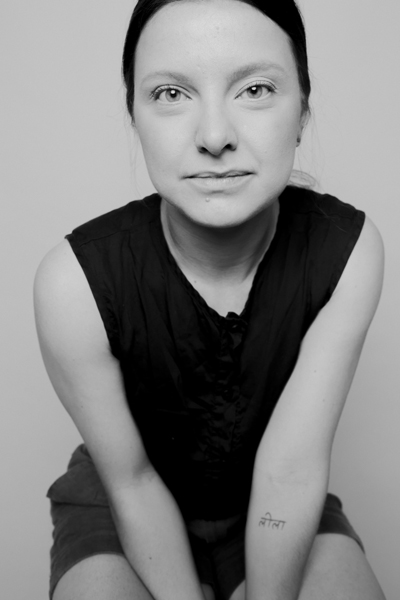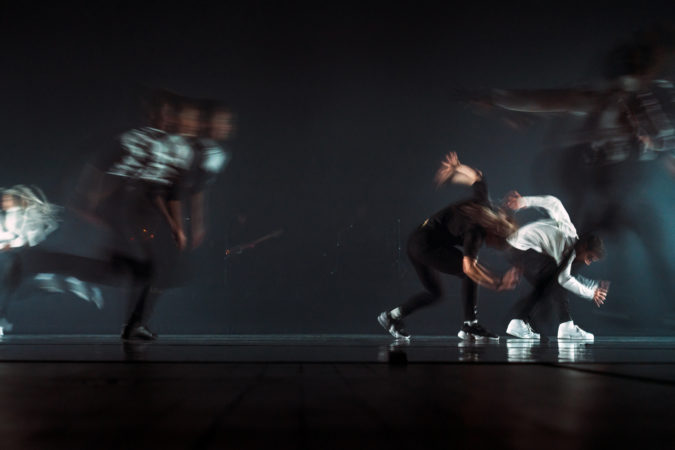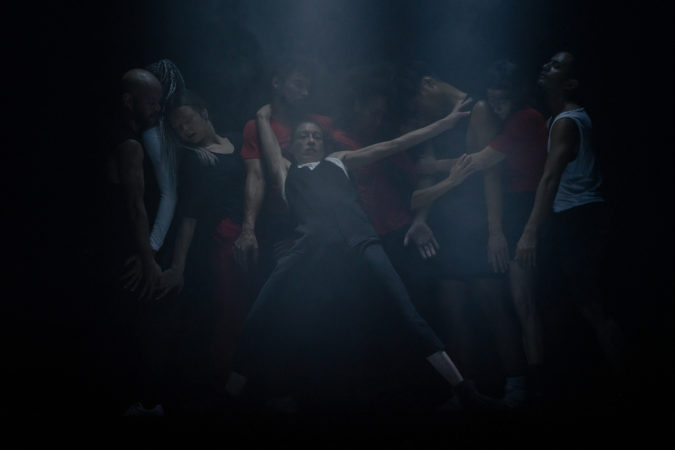Meet PuSh Artist Lexi Vajda
January 21, 2020
See Lexi perform in FRONTERA at the Queen Elizabeth Theatre on January 30th
To uncover what motivates Lexi Vajda is to crack open a striking and relevant perspective on dance.
Known for her powerful physicality, intelligent interpretation, and collaborative openness, this Vancouver based dancer and maker returns to the city with Montreal’s Animals of Distinction to perform FRONTERA as part of PuSh 2020.

Lexi has contributed to the arts scene in Vancouver and beyond for 10 years, working with names from Shay Kuebler’s Radical System Art, to Theatre Replacement, to Plastic Orchid Factory, to Tanz&Kunst Productions in Switzerland. She received the Vancouver Mayor’s Award for Emerging Artist in 2016, and PuSh audiences may recall her performance in MACHiNENOiSY’s Delicate Space at the Anvil Centre in 2019.
It was after running into FRONTERA choreographer Dana Gingras in Montreal that Lexi’s current collaboration was instigated. However, Lexi’s involvement in Gingras’s new work feels like more than a coincidence considering the boundary and surveillance challenging themes of the piece. When asked about her own artistic process, Lexi describes a critical but transcending ethos that seems to parallel the spirit of FRONTERA as well as our political moment that insists on art’s relevance.
During a busy schedule of FRONTERA performances in Quebec City and Montreal, Lexi recently responded to some PuShy questions about her art, her current creative process, the wider world, and how these come together in a Vancouver performance of Gingras’s latest show.
PuSh: What motivates your work as a dancer?
Lexi: For me, dance serves as a way to access realms of infinite change, depth, and discovery that exist in the body, its sensations, perceptions, psychologies. Working with the material of the body, in both performance and research contexts, allows for the work of exploring the meanings and narratives held within and conveyed by it, which inevitably exist in relation to the political and cultural landscapes we find ourselves in. Dance asks the questions of what it means to be human, in all of its complexity and beauty, and performance allows a sharing of these explorations.
P: For you, how is dance significant/relevant in the current political or social context?
L: In so many ways it’s significant politically. It’s in the ways we work, the ways we care for each other, the voices we choose to program, the experiences from life we draw from, the experiences that are generated for audiences. Dance as a form has the capacity to stray from linear narratives, to exist in places of unknowing, and to subvert conventional logic through the magic of the body in performance. Dance brings us back to our bodies, our voices, which can become subdued and quieted by the capitalist, colonial systems that surround us.

P: How did you get connected with Dana Gingras?
L: I guess it was about 10 years ago, Dana came to teach at modus operandi, where I was training. She shared with us her knowledge of dance and choreography in film, and it was so new and exciting for us. I followed her work when she performed in Vancouver multiple times. Last spring in Montreal we ran into each other and she was looking for a dancer for this project coming up. I guess it was just serendipitous timing!
P: How, or does, work in FRONTERA connect to some of your greater/ongoing values, interests as a dancer?
L: During the process, Dana really leaves space for each of us to bring our own interests into the work. So yes, there is always space for us as dancers to work on what we are working on individually. Each of us brings a different set of skills and curiosities, histories, style and energy. I try to find ways to include what I’m thinking about in the work… how am I finding joy, autonomy, connecting to the audience, the musicians, the other performers? A question I’m currently asking myself is how I can honour the experiences of those who are impacted by oppressive political, physical and economic borders while performing the piece; I think this will remain an open ended question for many of us inside the work.
P: Is there any significance for you in returning to perform FRONTERA in Vancouver?
L: It will be exciting to share the work with my community in Vancouver at PuSH. There’s always a bit more pressure at home, but also heaps of love and support. I’m really looking forward to chatting about the work with the community here.

P: Does the act of going to Montreal in order to come back with a guest company in your own city hold any significance for you or relate to any aspect of FRONTERA’s questioning of perceived boundary spaces?
L: This makes me think about dance across Canada and the boundary of distance that performance/art/dance communities experience due to the size of the country. Every dance community’s ecology is unique, and it might be interesting to be simultaneously immersed in the ecology of the Frontera team from Montreal while being here in my home ecology. I imagine this will be something to contend with in every city we perform in, sharing the work with different communities of audiences, all having unique experiences and notions of what borders, boundaries mean to them. I’m thinking about the fact that performance work tours and travels across the country, throughout the world, and how this demonstrates the economic privilege to collapse boundaries in space in order to exchange and share art.
P: How does dance, or the transient lifestyle of a dancer such as yourself reframe conventional notions of boundary, edges, political geographies, or surveillance?
L: In the past year I have been fortunate enough to have spent a lot of time working and performing outside of my home city. Moving around not only keeps things fun and fresh but has allowed me to open to new places and people, I feel my own boundaries softening, becoming more porous in novel situations. Moving place of course comes with numerous felt differences; as I find myself in different countries, cultures and communities my body knows and responds differently, is sensitive to new things. Working with the material of the body, dance offers the opportunity to subvert and question the boundaries of our physical experience through sensation and imagination, by forging new ways of being and moving. Although dance may not explicitly toy with political geographies, it highlights ways that we may feel and move together, amplifying empathy, and compelling more complex understandings of the astonishing depths of who we are aside from mainstream logics put forth by neo-capitalist society.
For more about Lexi go to: http://www.lexivajda.com/
Click here for FRONTERA show tickets and more information.
Story and Interview by Heather Myers, PuSh Festival Intern